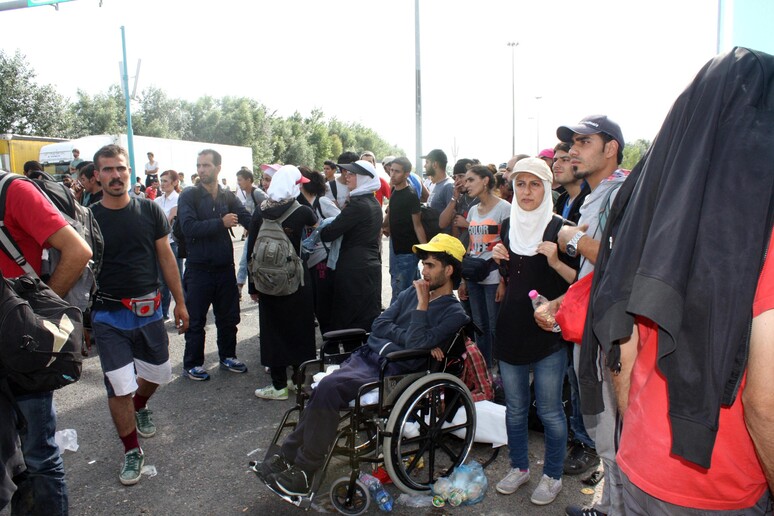The European Union on
Wednesday said that so-called hotspots for processing asylum
claims were already up and running in Italy - directly
contradicting Foreign Minister Paolo Gentiloni and other
government officials who had vowed that the spots would only
become operational once the EU agreed to share the burden of
repatriations.
Speaking on Italian TV Tuesday night, Gentiloni noted
that, for example, thousand and thousands of economic migrants
would have to be repatriated from the second hotspot nation,
Greece - an operation "on a scale not seen since the Berlin air
lift".
"Can we expect Greece to pay for that on its own," he
asked, saying that the EU principle of burden sharing must
include not only mandatory quotas under a new EU right of asylum
but also a special fund to help the countries of greater migrant
reception pay for sending them back home if their asylum claims
are turned down.
Interior Minister Angelino Alfano reiterated this
Wednesday, saying that "we are ready" to set up migrant
registration centres called hotspots but they will only be
activated "at the same time as the redistribution of the 24,000
asylum seekers (envisaged by mandatory quotas that were blocked
at a recent EU summit) and repatriations".
In the same vein, other officials from the ruling
Democratic Party (PD) have suggested that EU structural funds be
withheld from those member States who are unwilling to do their
fair bit for the migrant and refugee emergency.
"This is something that should be considered," said
Friuli-Venezia Giulia Governor Deborah Serracchiani, "for those
eastern European countries that are refusing to take migrants in
or let them pass - such as Hungary, which has arrested hundreds
of refugees at its newly constructed fence on the border with
Serbia.
The Italian media, and some opposition figures, have also
voiced voices that, given the sluggishness of Italian
bureaucracy, the hotspots would become "major refugee camps on
Italian soil, with all the problems they entail".
But optimists have retorted that foreign expertise, such
as from the UNHCR, will be brought in to make the hotspots work
more quickly and efficiently.
At all events, Natasha Bertaud, the European Commission's
migration spokesperson, said Wednesday that the so-called
hotspots being created to process asylum claims were already
starting to work in Italy.
"Experts from EASO, Frontex, Eurojust and Europol are in
Italy and the hotspots are starting to function, so it will be
possible to start the relocations from the start of October,"
she said.
ANSA sources said Italy and Greece had both delivered
their roadmaps for dealing with the refugee emergency to
Brussels.
But Italian President Sergio Mattarella appeared to resist
EU pressure on Italy to open the hotspots by saying that "a
comprehensive response" including repatriations, quotas and
other burden sharing was needed before they could become
operational.
"Only that way is an effective response possible", he
said.
Mattarella added that an "assumption of responsibility by
the European Union" was necessary to deal with the refugee
emergency after a meeting with his Austrian counterpart Heinz
Fischer.
"This is a growing phenomenon whose size means it must
have common EU management and not be handled by the individual
countries," Mattarella said.
"The EU must be more present on all dossiers," Mattarella
added.
Europe's migrant crisis took another ugly turn Wednesday
when Hungarian riot police used tear gas, pepper spray and water
cannons to beat back hundreds of people massed at the border
with Serbia after some broke through a gate.
Children cried as they fled from the acrid smoke, and
several people fainted in the chaos.
With the route through Hungary apparently closed, some
migrants set out on a longer, more arduous route into Western
Europe through Croatia.
With several countries having closed their borders -
Germany and others temporarily given a huge surge in Syrian
refugees - Italian officials have highlighted the risks to the
free movement of people enshrined in the Schengen Accords.
European Migration and Home Affairs Commissioner Dimitris
Avramopoulos told a plenary session of the European Parliament
Wednesday the closure of borders by several EU members "is not
the end of Schengen, Schengen exists, it's a great success of
the EU and we will defend it".
Avramopoulos told the EP that "the defence of borders with
violence is not compatible with European values and principles".
Slovenia on Wednesday became the latest country to restore
temporary border controls along its border with Hungary.
With the Hungarian fence in place, many Syrian refugees
were said to be returning to Croatia, running the risk of
straying into areas peppered with old mines from the conflict
that ensued when Yugoslavia broke up.
UN Secretary-General Ban Ki-moon said he was "shocked at
seeing how some migrants and refugees are being treated, it's
not acceptable."
He said "these are people fleeing war and persecution and
they must be treated with human dignity".
Ban urged all States to "assume their responsibilities and
carry out their legal obligations".
Hungarian Premier Viktor Urban said that if EU quotas
became law they would have to be "accepted".
He said that a fence would also go up on the border with
Croatia.
ALL RIGHTS RESERVED © Copyright ANSA











